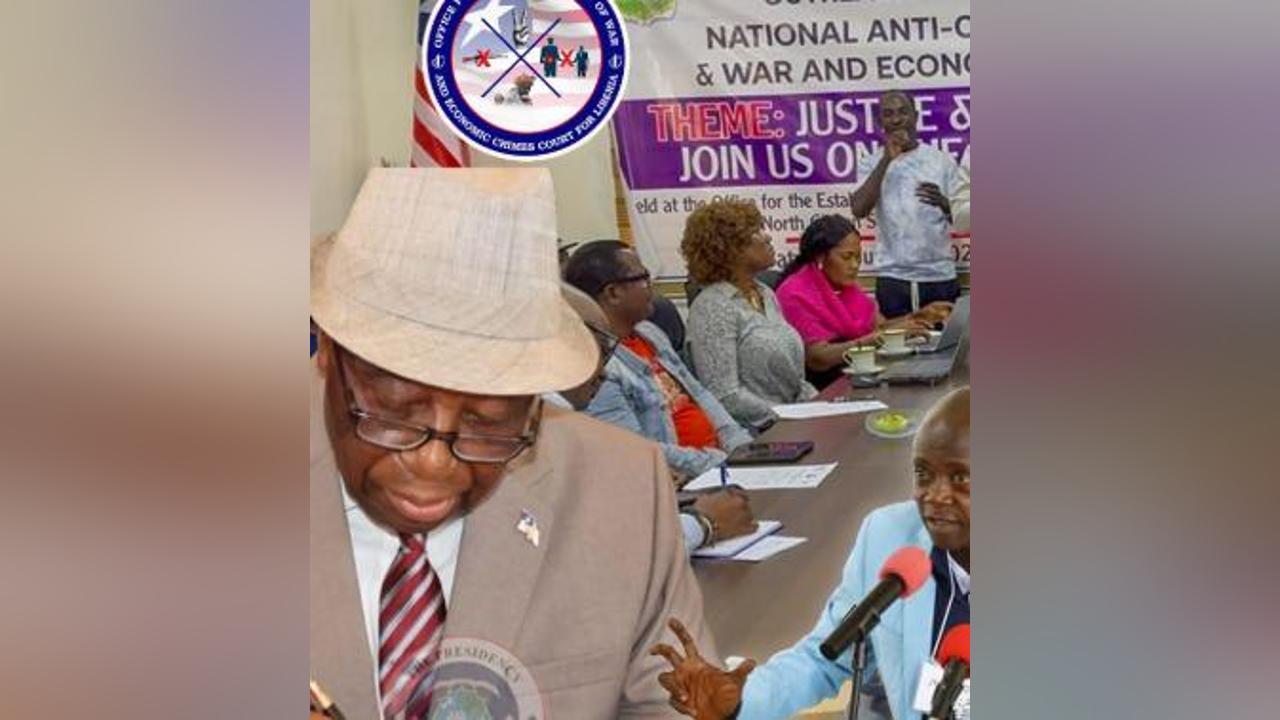Anthony Stephens
Africa-Press – Liberia. Jallah Barbu, executive director of the Office of War and Economic Crimes Court of Liberia, said he had received just $US300,000, or 15 percent, of President Boakai’s promised $US2 million for the 2025 budget year
Experts praise the president’s latest move, but urged him to fully fulfil his pledge
Office boss Barbu prepares to head to Nigeria for important meeting with Ecowas president
The Office of War and Economic Crimes Court of Liberia said Thursday that it had received $US300,000 or 15 percent of President Joseph Boakai’s promised $US2 million for 2025, for its operations. The president pledged the funding in late April when he extended the mandate of the Office by one year through an executive order.
Jallah Barbu, executive director of the Office, made the disclosure during the 4th monthly National Transitional Justice Coordination Committee meeting, attended by leading transitional justice actors, including the civil society, victims and survivors of Liberia’s brutal civil wars, the international community and media.
The partial funding came months after Barbu said it had exhausted $368,000 given to the Office in January. It follows President Boakai implementing a range of recommendations of the 2009 Truth and Reconciliation Report – including an official apology to victims, a commitment to a national memorial and a national public holiday to honor the victims. But the failure to provide funds had made justice advocates concerned the president was making a lot of commitments without putting up funding to back it.
The funds were to be disbursed quarterly. By now the government should have paid $1 million. Barbu had repeatedly complained that he and his staff had not been paid for seven months. He told FrontPage Africa/New Narratives in an interview after the meeting that they were glad that the money had come.
“This gives us some relief, at least in terms of the staff salaries and the basic operations and logistical needs, while we also move forward,” said Barbu. “We’re taking our time to calculate right now in terms of how much can we pay from this fund, how much more will remain for also center operations. The bulk of the money would go to salaries because of the number of months that we owe. But I mean, as a responsible institution, we still have to keep the Office’s doors open. We have to engage the public, so we will definitely use some of the money for that purpose.”
Barbu also disclosed that he is set to make an all-important trip this month to meet with president of the Economic Community of West African States (Ecowas) in Abuja, Nigeria. If Liberia is to establish a court to try so-called international crimes, including war crimes and crimes against humanity, it will need the regional body to be an official partner. Ecowas support is not guaranteed and it can take time to secure. Meetings are only held every six months. The Gambia recently had to wait an extra six months to secure Ecowas agreement to back its transitional justice court after it failed to win support of the right officials in its first go.
The Ministry of Foreign Affairs is working with us to ensure that the arrangements are made.
Jallah Barbu
The move attracted praise from transitional justice experts.
“I’m delighted that the president has partially fulfilled his promise,” said Hassan Bility, director of the Global Justice and Research Project. Bility’s organization and Civitas Maxima, the Swiss based justice activists, have been working with American and European investigators and prosecutors to document war-related crimes in Liberia.
The funds arrived amid growing concern from leading local international stakeholders, including Mark Toner, the outgoing U.S. ambassador to Liberia. In an exclusive interview recent interview with FPA/NN, Toner urged the government to support the Office and fund the country’s broader transitional justice process.
Experts say funding is critical for the Office, which in July officially launched a national outreach campaign for a war and economic crimes court and a national anti-corruption court. Officials said the initiative will include community town halls, radio and television broadcasts, and social media messaging aimed at countering misinformation and disinformation and engaging the public on the courts’ and Office roles in Liberia’s peace and justice process.
While Boakai has been praised by advocates for the courts for his initial steps, they’ve also criticized him for the scale of support to the Office.
“While I believe it’s a start, $US300,000 is like a drop in the ocean,” Bility said. “I have to emphasize this is just 15 percent of the $US2 million promised.”
Bility renewed his longstanding call for the government to prioritize the courts.
“Mr. President, what about cutting funding for some less important projects, benefits and allowances allocated for your government officials, to fund this Court?” asked Bility. “To the Honorable lawmakers I say: Can you please forgo some of your personal benefits for the greater good of our common patrimony, Liberia, and its safety with respect to deterrence in the form of accountability for these war related crimes? Please do this so that even generations unborn will say: ‘our forefathers stood where duty required them to stand. It’s now time to rise above personal interest in favor of the general good.’”
Barbu said he was confident of receiving support from the government, particularly the president for his Office and the courts.
“The president takes this process as a very, very, serious national initiative,” said Barbu. “I don’t think funding will be an issue, at least in terms of the basics that we are talking about, salaries, logistics, the National Outreach Program and other operations.”
In a roadmap submitted to Boakai, the Office said it would undertake study tours in Sierra Leone, The Gambia, and the Central African Republic— countries that have established transitional justice mechanisms. Some advocates warned that with limited donor funding, the Office should visit only one country.
Mr. Barbu acknowledged those concerns but insisted the trips would go ahead, citing “commitments from a few partners,” though he declined to name them.
Source: FrontPageAfrica
For More News And Analysis About Liberia Follow Africa-Press






